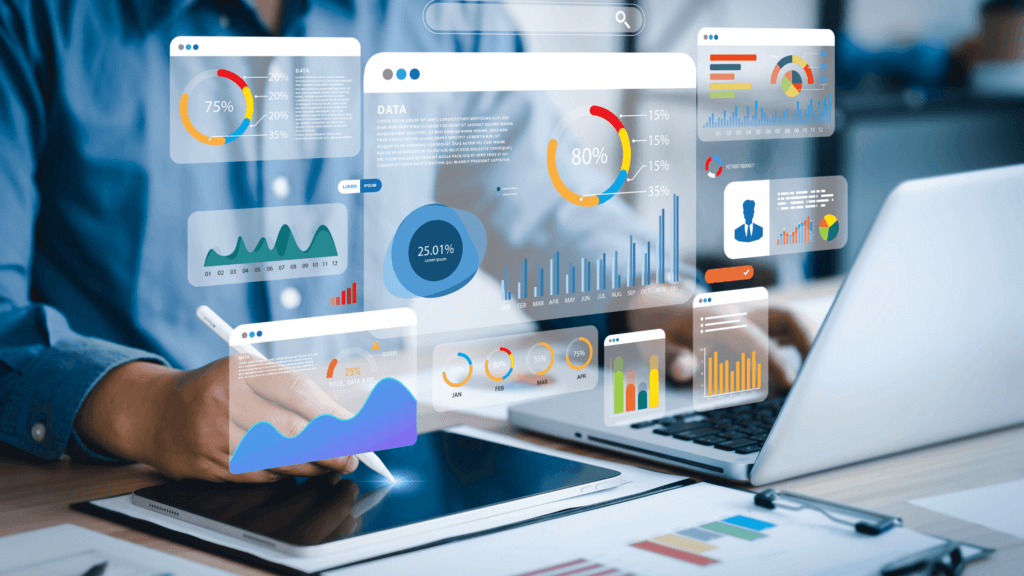An Enterprise Resource Planning (ERP) system is a software product that allows organizations to streamline and manage their business processes. Accounting processes, financial management, business intelligence, and human resources management don’t have to be completely separate systems. Utilizing a single source can save construction companies time and money and the headache of onboarding and learning multiple software tools.
What is an ERP system?
Construction is one of the largest and most logistically complicated industries today. From project planning to execution to completion, stakeholders from various professions—contractors, engineers, architects, suppliers, skilled laborers, and others—work cohesively to get the job done.
ERP software is a comprehensive solution for construction and other trade industries. It handles all logistics, regardless of complexity, and streamlines processes to ensure smooth project completion.
Key features of ERP software

Accounting, financial management, and payroll
The accounting and payroll features can record, track, and analyze a construction company’s financial data, including inventory, sales, expenses, cash flow, and more. A proper construction-specific accounting system will simplify financial tasks, make reporting easier and faster, and reduce the risk of human error.
The right ERP will also be able to handle payroll tasks. Managing and recording material costs and labor is time-intensive, especially with various stakeholders stepping in and out of the project. This software will connect your worksite data with the back-end payroll management system to ensure employees are paid promptly.
Automation
Because construction process management is so complex, navigating tasks and to-dos manually is quite labor intensive. Ensuring your ERP system utilizes automation is the best way to make the process more efficient.
Some of the processes that could be automated include inventory management, payroll, simple accounting processes, and customer service tasks. This time-saving feature allows admins and project managers to spend more time on high-value work.
Integration
Similarly to automation, integration features are vital for making tasks clear, fast, and easy to execute. Integration allows you to sync multiple software tools to work out of one place instead of manually copying and pasting data to multiple applications.
ERP systems might offer integrations for inventory systems, sales, human resources, manufacturing, supply chain management, and more. Having reliable visibility in a single source helps all stakeholders make better strategic business decisions and boost productivity.
Customer relationship management
A Customer Relationship Management (CRM) system records people’s data, which in a construction context means buyers and clients. These systems allow construction companies to record their buying history and better develop marketing strategies and sales pitches.
A CRM provides a pipeline to sellers and customer success managers so they can pitch, streamline procurement, and efficiently onboard new clients. It also allows marketers to build campaigns from that data, and business admin can track fulfillment and intervene if necessary.
Human resources
Human Resources (HR) software helps construction companies attract, gain, and retain employees. With the growing labor shortage in construction, HR software must run smoothly.
At the very least, companies need HR software to house employee data. It documents personal data and banking information, which can then be integrated securely with payroll and accounting features.
Business intelligence and data analytics
Business intelligence and data analytics features measure the performance and output of each construction project. These metrics include performance efficiency, production time, and financial status data.
Stakeholders, including project managers, use business intelligence data to plan and make crucial decisions about the following jobs. The financial model in the data analytics section must also be auditable for analysis and investigation, helping companies and clients better manage their finances.
How ERPs can help control construction cash flows
The construction sector is one of the most complex industries in the accounting and finance world. Because of this, the construction-specific ERP market is expected to grow in the coming years. The global ERP software market is predicted to grow from $71.4 billion in 2023 to $ 81.8 billion in 2024.
When companies adopt an ERP solution tailored to their industry, it gives their organization an integrative, purposeful, and scalable solution for business growth. The ERP system will allow their business to connect every department and ensure that cash flow is monitored, recorded, and reported efficiently.
How to choose the right ERP software for your company

ERP tools are diverse in what they offer, so the best solution depends on your organization’s needs. For example, a specialty contractor might prioritize software that can support subcontractor management and project costing, while a larger organization will need something that can support a large workforce and more intricate processes.
The right ERP software for your team should allow you to:
- Manage workforce scheduling
- Complete timely payments and log expenses
- Provide data and real-time project insights
- Manage specialty contractors
- Integrate other tooling like spreadsheets
- House employee data and human resources programming
- Automate routine financial reporting and other accounting processes
Best construction ERP software
Ultimately, the best construction ERP software will depend on your company’s business, budget, and must-have ERP features. The following solutions have a lot of general benefits and could make an excellent jumping-off point for your search.
- SAP Business One Professional: Features include talent management, building operation and maintenance management, accounting and finance, and project management. It has all of the standard ERP functionality and robust forecasting features, with a simple UI and the ability to be deployed on-premise or via the cloud.
- Microsoft Dynamics 365 Business Central: Best features include budget monitoring, estimation, project management, accounting templates, and more. It has robust finance features, integrates seamlessly with other Microsoft products, and even has a free trial. This software can be deployed on the cloud or on-site.
- Acumatica: Key features include job cost accounting, financial management, compliance, CRM, change management, and more. This software is scaleable as your business evolves and is accessible via the cloud on any device.
- Oracle Fusion Cloud: Highlights include project accounting, fixed asset management, purchase order management, and more. This software offers strong accounting automation, has a simple UX, and is available on the cloud.
- Epicor Prophet 21: Supports supply chain and inventory management, sales, warehouse management, finance and accounting, and more. It has a great UI, e-commerce, and sales automation. There’s no free trial, but it supports cloud and on-premise applications.
Bottom line
Managing the ins and outs of your construction company doesn’t have to be the headache it appears to be. Thanks to comprehensive ERP systems, you can automate, integrate, and work seamlessly between all departments to complete any project.
CRM systems, finance processes, and even human resources can be effectively streamlined into one source to boost productivity and supercharge cash flow, all without sacrificing the quality of work.
Subscribe to our weekly newsletter to stay in the loop about the best construction tools.


